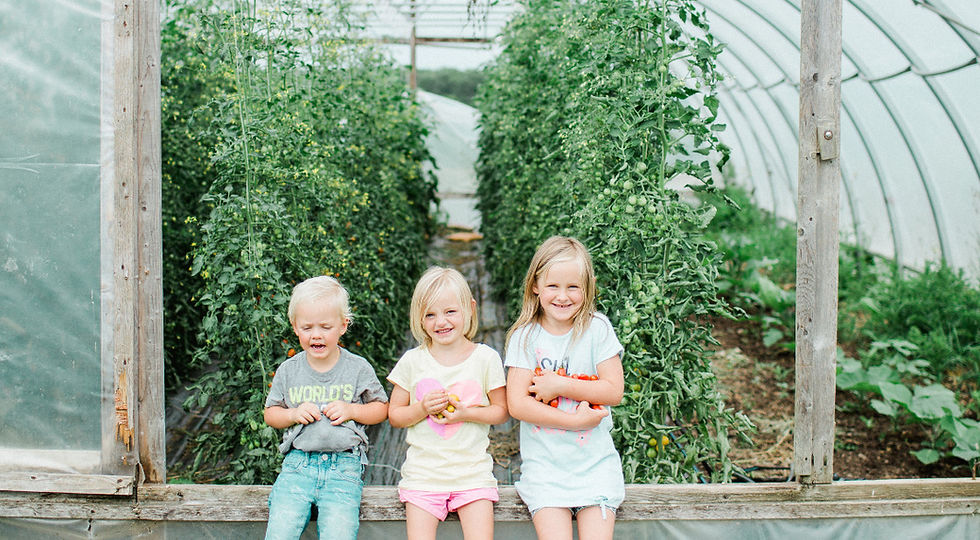

How is our farm different?
We grow our veggies on less than 2 acres using intensive crop spacing and soil management to produce high yields. We follow 'beyond organic' farming principles, which means that while we are not certified organic, we hold ourselves to values and practices that create healthy soil, clean food and ecological happiness. We maintain our soil fertility by using soil amendments that are certified for use in organic food production. We don't use any synthetic pesticides, preservatives or chemical fertilizers. We source organic, non GMO seeds. We create healthy soil through compost and mineral applications.

Handfuls of vine ripened cherry tomatoes

Grillo tiller preparing a bed for planting

Onion beds

Handfuls of vine ripened cherry tomatoes
Soil Health
Our soil is our most important ecosystem! It is estimated that one tablespoon of soil has over a billion hardworking bacteria, fungi and other critters in it, and these critters are responsible for feeding the plants that we grow. Our job is to create a rich environment that favours an abundance of helpful soil critters so they are able to function uninhibited and provide our plants with the full spectrum of micro and macro nutrients. We “feed the soil so the soil feeds us" with these methods:
Organic fertilizers
Organic alfalfa pellets provide a slow release nitrogen source and are also loaded with beneficial plant hormones and micro nutrients. Kelp meal is another slow release soil food loaded with micro nutrients. Actisol is a pelleted hen manure made in Quebec that provides a bigger hit of nitrogen for heavy feeding crops and also contains a lot of calcium and trace minerals. Organic soy meal is used occasionally in the hoop houses. Gaia green 4-4-4 is a great blend of organic fertilizers and minerals which we use in our potting soil mix to give our seedlings a good start!
Green manures
We use green manures on the areas we grow field crops like potatoes, squash and sweet corn. Green manures are crops that are planted, grown out for a while and then turned into the soil to feed the soil life. Depending on the time of year, we use mixed clovers, hairy vetch with rye or peas with oats, buckwheat or other organic seeds that will provide a good stand of green manure.
Animal manure compost
We source goat and horse manure from local farmers to make compost on the farm. We have also brought in some turkey/mushroom compost mix called TLC from Schlegel Poultry.
Leaf compost
Each fall we source a huge pile of shredded leaves which we compost down for a year or two. The resulting leaf mold is a carbon-rich black soil amendment that helps hold water and loosen our tight, clay loam soil. We like to apply a layer of finished leaf mold to prepared beds and let the earthworms mix and drag it down into the earth. This is similar to using peat moss for soil structure improvements, but we like it for its local availability, sustainability and for the micro nutrients it contains.
Soil minerals
Soil minerals can be used to address the needs of specific crops. These are applied when needed to maintain balance in the soil. So far we have used greensand, black earth humates, natural trace mineral salt, soft rock phosphate, Magnesium sulphate (epsom salt). We continue to look for sources of naturally occurring rock minerals that will feed our soil just what it needs! We buy most of our soil amendments from BioAg in Wellesley or Gaia Green suppliers.
Pest Control
We use companion planting to confuse insect pests. An example of this is to plant onions beside carrots – the onion smell repels the carrot fly and the carrot smell repels the onion pests! We encourage beneficial insects, birds, frogs, toads and snakes to do our pest control for us by letting a diversity of native plants exist around our gardens to provide them some habitat. We exclude insects using insect netting or row covers. For potatoes we use gold old bug picking sessions to beat the potato beetles. Overall, our goal is to increase soil health and meet our plants needs so they are less stressed by our dynamic southwestern Ontario weather!
Weed Management
Weeds are hand picked or removed with hand tools in the intensive area of our farm, and the row crops are weeded using a small garden tractor.